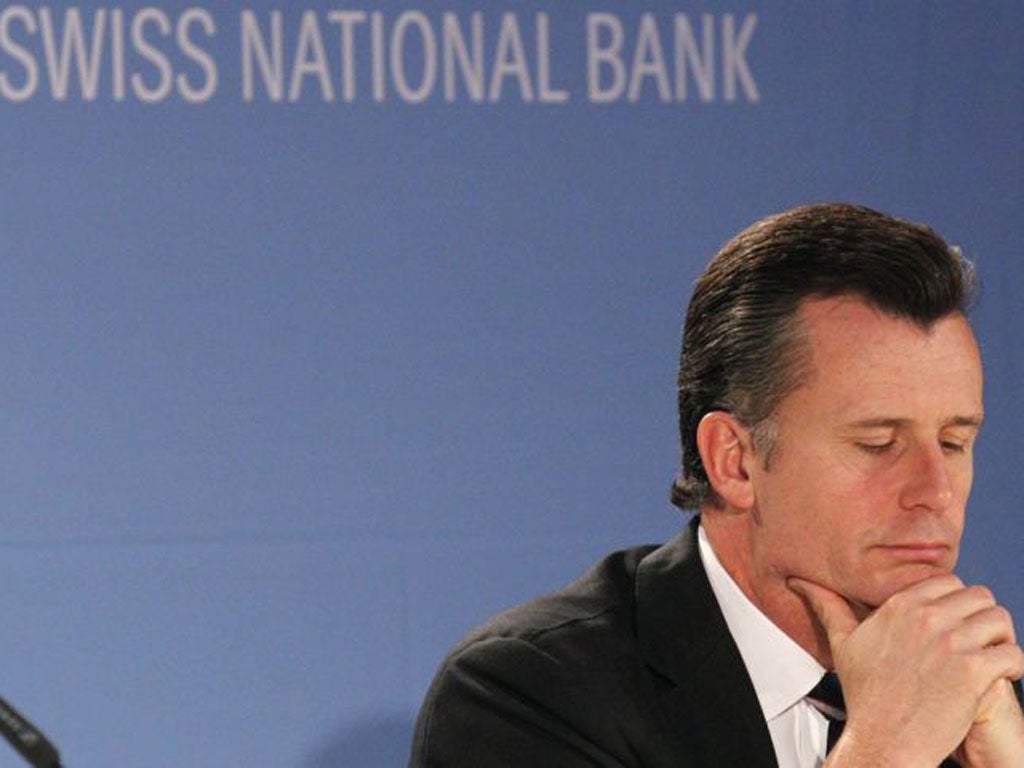Switzerland's top banker – and his wife – in insider trading row
National Bank denies that Swiss franc currency dealings broke rules

Your support helps us to tell the story
From reproductive rights to climate change to Big Tech, The Independent is on the ground when the story is developing. Whether it's investigating the financials of Elon Musk's pro-Trump PAC or producing our latest documentary, 'The A Word', which shines a light on the American women fighting for reproductive rights, we know how important it is to parse out the facts from the messaging.
At such a critical moment in US history, we need reporters on the ground. Your donation allows us to keep sending journalists to speak to both sides of the story.
The Independent is trusted by Americans across the entire political spectrum. And unlike many other quality news outlets, we choose not to lock Americans out of our reporting and analysis with paywalls. We believe quality journalism should be available to everyone, paid for by those who can afford it.
Your support makes all the difference.The president of Switzerland's central bank was under pressure to resign last night after allegations that he had used insider information to reap huge profits from foreign exchange transactions before the Swiss franc was devalued and pegged to the euro last year.
The charges against Philipp Hildebrand, head of the Swiss National Bank (SNB), were made by the weekly newspaper Die Weltwoche yesterday – hours after Mr Hildebrand's wife admitted to privately using last year's soaring franc to buy $500,000, which were later converted back at a profit.
The bank said last month that Mr Hildebrand's wife, Kashya, a former currency trader who now runs a Zurich art gallery, bought an unspecified amount of US dollars for herself and her daughter. The bank did not say who authorised the sale, but it said its oversight body had found no signs of improper transactions.
A report by auditors at PricewaterhouseCoopers cites emails indicating that Mr Hildebrand learnt of his wife's decision to buy $504,000 for SFr400,000 on 16 August – a day after the transaction occurred.
But Die Weltwoche said it had obtained bank statements showing that Mr Hildebrand had himself purchased large sums in US dollars in the months before his bank devalued the franc in September last year.
"In March alone he bought US dollars for SFr1.1m," the paper said in a statement released before yesterday's article. "It is classic [foreign exchange] speculation," claimed Philipp Gut, the paper's deputy editor in an interview. "The only option is for him to step down," he added.
The SNB declined to comment on the allegations yesterday.
The newspaper reported that Mr Hildebrand also bought more than $500,000 in two transactions in August last year, weeks before the franc was devalued. It added that three weeks after the devaluation, Mr Hildebrand sold his dollar holdings for a profit of SFr75,000.
Mr Gut said an employee from Bank Sarasin, the Swiss bank where the Hildebrands hold their private accounts, had told the newspaper that it was Mr Hildebrand, not his wife, who had bought the dollars before the franc's devaluation.
Bank Sarasin revealed on Tuesday that it had sacked an unnamed employee who had breached Swiss banking secrecy laws by leaking confidential information on transactions "by the family of the president of the Swiss National Bank".
Switzerland decided to devalue its currency early last autumn after businesses complained that its soaring value had hit exports. Tourism had also suffered as visitors were deterred by the country's high prices.
On 6 September last year, the SNB took the unprecedented step of pegging the franc to the euro at a minimum exchange rate of SFr1.20. The surprise move caused the value of the franc to plummet.
Die Weltwoche's disclosures were the latest twist in an alleged banking scandal at SNB which has gripped Switzerland since shortly before Christmas when, in an apparent attempt to quell rumours about its head, the bank disclosed that Mrs Hildebrand had bought unspecified amounts in dollars for herself and her daughter on a purely private basis.
SNB later issued an unsolicited statement insisting that rumours of wrongdoing by Mr Hildebrand were unfounded and that the bank's rules against insider trading had not been breached.
The disclosures about Mrs Hildebrand's dollar purchases nevertheless prompted a media storm, which her public statements on Tuesday seemed designed to defuse.
Join our commenting forum
Join thought-provoking conversations, follow other Independent readers and see their replies
Comments